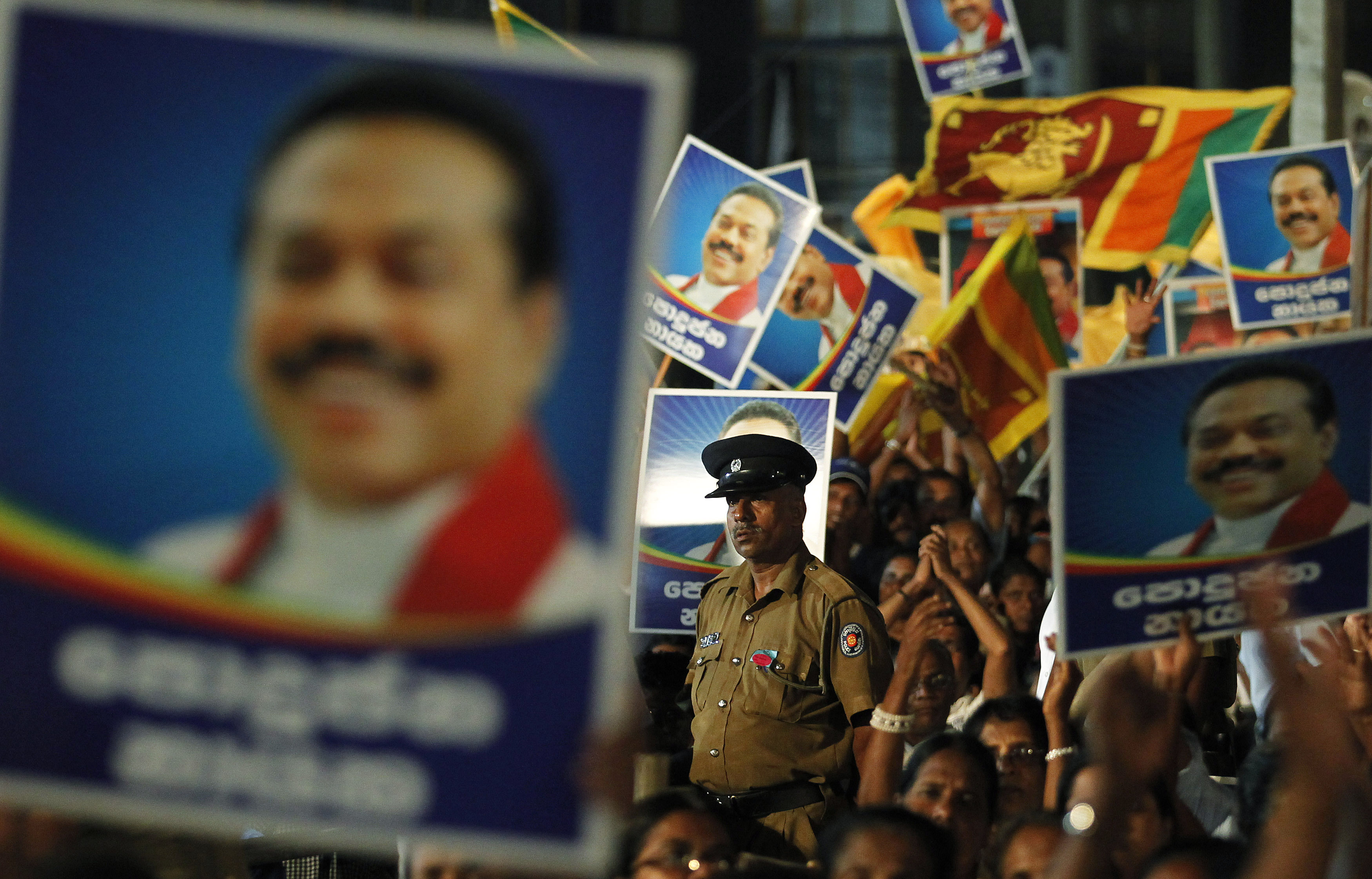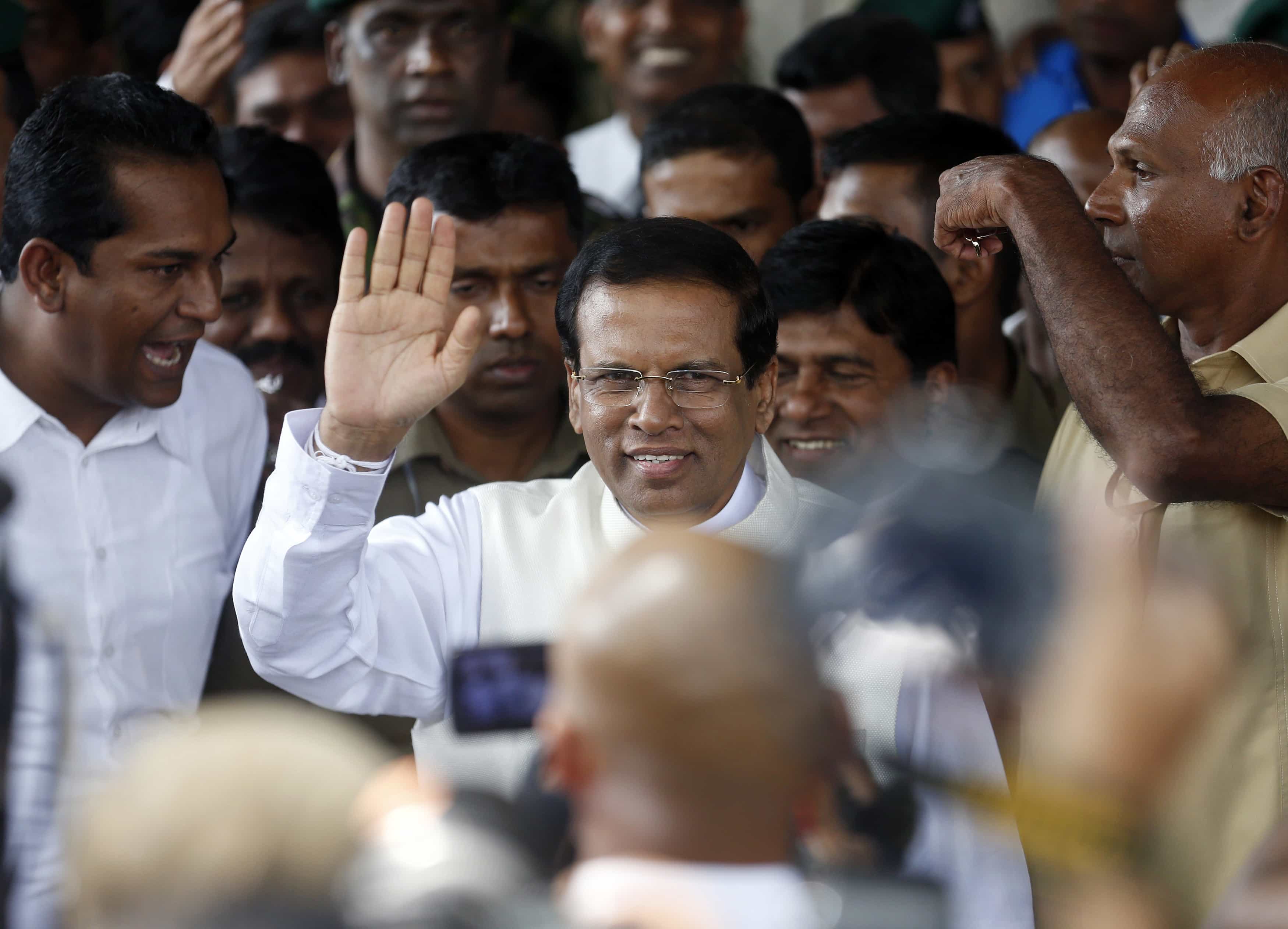Elections on 8 January put an end to Mahinda Rajapaksa's rule in Sri Lanka, which had been criticised for its increasing authoritarianism and a repressive media environment.
Sri Lanka’s new president, Maithripala Sirisena, was sworn in on Friday 9 January 2015 after the incumbent Mahinda Rajapaksa conceded defeat to his former political ally and health minister. The poll which has been described as the most significant election in decades, put an end to Rajapaksa’s decade-long rule, which critics say had been marked by increasing authoritarianism, corruption and nepotism.
Sirisena’s new government has already pledged to stop blocking websites, end intimidation of the media and reopen an investigation into the murder of a high-profile journalist.
As some measures began being implemented, hope was expressed in this tweet by Sri Lankan journalist and human rights defender Sunanda Deshapriya, currently based in Geneva.
Tamil Net unblocked in #SriLanka almost after a decade; Internet censorship is over, it seems #lka @FMMsrilanka @cpjasia @ifjasiapacific
— sunanda deshapriya (@sunandadesh) January 13, 2015
IFEX members and press freedom advocates have welcomed promises that press freedom in Sri Lanka will improve, albeit with some caution – and they have put forth recommendations for the new government to consider if it wishes to distance itself from the repressive press environment emblematic of Rajapaksa’s reign.
On 16 December 2014, the Free Media Movement (FMM) submitted short term proposals for re-establishing freedom of expression rights in the country to the opposition and then presidential candidate Sirisena.
The Free Media Movement [FMM] has repeatedly requested the present Government led by President Mahinda Rajapakse to protect freedom of expression rights of all Sri Lankans which is based on people’s right to information. However, since our requests have been completely neglected by the Government headed by the President, FMM does not think that another plea to Mr. Rajapakse, who is contesting for the third term, will bring any result.
Therefore, FMM submits the following short term proposals to the common opposition and its presidential candidate Mr. Maithripala Sirisena to be implemented within the first hundred days of winning the presidential election in order to ensure media freedom in the country to some extent.
Proposals follow on 1. Freedom of Information, 2. Abolishing Impunity, 3. Independence of Media, 4. Abolishing Censorship, 5. Social Responsibility.
The Free Media Movement [FMM] has repeatedly requested the present Government led by President Mahinda Rajapakse to protect freedom of expression rights of all Sri Lankans which is based on people’s right to information. However, since our requests have been completely neglected by the Government headed by the President, FMM does not think that another plea to Mr. Rajapakse, who is contesting for the third term, will bring any result.
Therefore, FMM submits the following short term proposals to the common opposition and its presidential candidate Mr. Maithripala Sirisena to be implemented within the first hundred days of winning the presidential election in order to ensure media freedom in the country to some extent.
Proposals follow on 1. Freedom of Information, 2. Abolishing Impunity, 3. Independence of Media, 4. Abolishing Censorship, 5. Social Responsibility.
The International Federation of Journalists expressed hope that the FMM’s media reform proposals would be quickly taken into account and it highlighted the problem of impunity in the country.
“Impunity is a major issue for press freedom in Sri Lanka as investigations into killings, disappearance, attacks and threats on journalists and media institutions have not taken place. The IFJ urges the new Sri Lankan government to immediately establish mechanisms to investigate crimes against journalists and ensure the safety of media workers across the country.”
It’s notable that over the past several years, the press freedom index in Sri Lanka has been on a steady decline. There has been systematic harassment of the media, with killings, attacks and threats to opposition voices; forced exiles and restriction attempts such as police questioning the media, restrictions on online media and threats to organizations training journalists, especially those from Tamil dominated areas.
“It’s an opportunity for Sri Lanka and the new government to ensure democratic governance by ensuring complete media freedom and respect for freedom of expression.”

A police officer stands guard among images of then president Mahinda Rajapaksa during his final rally ahead of the presidential election in Piliyandala 5 January 2015REUTERS/Dinuka Liyanawatte
The International Press Institute welcomed the proposed changes but commented that some observers remain wary. It spoke by email about the latest developments with Sri Lankan journalist Uvindu Kurukulasuriya, founder and editor of online newspaper The Colombo Telegraph, who has been living in exile since 2009.
The new president, who took office on Friday, reportedly has already ordered the Telecommunications Regulatory Commission to lift a ban on news sites that were blocked under Rajapaksa. The new prime minister, Ranil Wickremesinghe, announced that journalists in Sri Lanka should feel “free to report whatever you want without the fear of being abducted”, and another politician, Rajitha Senaratne, urged Sri Lankan journalists and political dissidents currently living in exile to return.
The new administration has promised to investigate the high-profile 2009 killing of critical journalist and IPI Press Freedom Hero Lasantha Wickrematunge. In the six years since his death, no progress has been made in finding and bringing those responsible for his murder to justice.
[ . . . ]
Sirisena has promised to expand media freedom and to dismantle the architecture of corruption and nepotism that plagued the former Sri Lankan government. However, despite those promises, he also indicated that he does not intend to pursue the prosecution of the former president or members of the armed forces for potential war crimes committed during the conflict with the LTTE.
Like IPI, the Committee to Protect Journalists expressed caution, questioning “what changes, if any, will come for press freedom in a country that had grown deeply repressive under the previous leadership.”
Sirisena’s candidacy was backed by many local media advocates and freedom of expression groups, including the Free Media Movement, but commentators have advised that any jubilation over his victory should be tempered. While Sirisena has pledged to tackle corruption and ensure greater transparency, he draws his support from many of the same actors as the previous government. “Sirisena has promised to abolish the strong presidency introduced by Mr. Rajapaksa and return the country to a parliamentary system, but the coalition around him is a sprawling, diverse one, including Buddhist nationalists, Marxists and center-right politicians, among others,” wrote journalists Ellen Barry and Dharisha Bastians in The New York Times after the win, which Barry described as “a jaw-dropper.”
And Indian journalist Samanth Subramanian, writing in The New Yorker, said, “Like Rajapaksa, Sirisena ardently courts the Buddhist right, and he has said that he won’t diminish the strength or the influence of the Army.”
